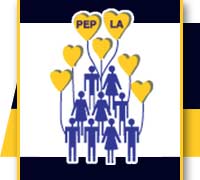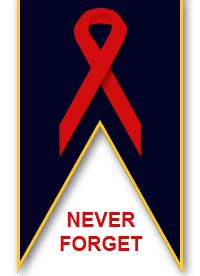INTERNATIONAL “SATELLITE” PROGRAMS OF PEP/LA
(PEP/INTERNATIONAL) 1986-2010
Wendy Arnold, M.P.H., President
The Peer Education Program of Los Angeles (PEP/LA) is a non-profit organization in which multi-cultural teens from high schools, residential facilities and probation centers are trained to be peer educators in HIV/AIDS information. The mission of PEP/LA is two-fold: 1) to decrease the rising incidence of HIV transmission in adolescents; and 2) to elevate the care, respect, compassion and hope of people who live with HIV/AIDS.
PEP/LA has established 25 Peer Education Programs (PEPs) throughout Southern California, ("PEP/Satellites") the United States and has set up more than 120 teen PEPs and 80 “Train the Trainers” workshops in 28 countries (PEP/INTERNATIONAL). Since 1986 most of these programs (listed below) continue to be successful in reaching teenagers with HIV/AIDS prevention. In 2011, we look forward to welcoming several more African countries into our family of more than 12,600 teens and 8,800 "Trainers" who have been trained directly under the PEP/LA model. Respecting cultural, ethnic and economic differences, PEP/LA has designed training agendas that are flexible and can be adapted to the specific concerns of each country. Innovative strategies for involving multi-disciplinary participants from political, academic and medical arenas have led to the development, implementation, evaluation and revision of international PEPs that effectively reach adolescents with vital life-saving messages about how to avoid an exposure to HIV and how to stop the discrimination of people who live with HIV/AIDS.
Our appreciation to the following governmental and non-governmental (NGOs) sponsors:
-
PEP/ARMENIA – (1998) – (Yerevan). Sponsors: Armenian Ministry of Health, Ministry of Education and Science and Scientific Association of Medical Students of Armenia (SAMSA).
-
PEP/BELIZE – (1997, 1998) – 5 PEPs (Belize City, Orange Walk, Punta Gorda, San Pedro, Corozal). Sponsors: Pan American Health Organization (PAHO), UNICEF, UNAIDS, Belize National AIDS Task Force.
-
PEP/CAMEROON – (2003) – 2 PEPs. (Limbe, Magunje, Mutengene). Sponsors: Association for the Rehabilitation and Wellbeing of Youth (ARWY), Province Hospital of Limbe, Limbe Coffee Processing Company, Cameroon Baptist Convention, The German Cooperation (GPS), others.
-
PEP/CONGO-Brazzaville - (2006) 1 PEP. Sponsors: AZUR Development, Silvia Niombo.
-
PEP/CONGO-DRC - (2006) 3 PEPs (Kinshasa, Goma). Sponsors: "ILDI-ONGD", "Marman Lamukas", "MIDEFHOPS", Isidore Kalimira.
-
PEP/GHANA – (2003, 2004, 2010) – 9 PEPs. (Kumasi, Agona, Accra, Bipoah Ashanti, Patriensa, Buduburam, Elmina, Kissi). Sponsors: Rural Youth Development Association in Kumasi, Ashanti Health Services of the Ministry of Health, Asante-Akim Multipurpose Telecommunication Centre (AAMCT) of Patriensa, Mt. Olive Presbyterian Church of Patasi, Self-Help Initiative for Sustainable Development (SHIFSD) of Buduburam, Komenda Edina Eguafo Abirem (KEEA) of Elmina District Council, Kingsby Hotel in Accra. In 2010: Embassy in Accra, West African AIDS Foundation (WAAF), Ghanian Military/
-
PEP/GUYANA - (1994) – (Nieuw-Nickerie). Sponsors: PAHO, Suriname National AIDS Programme.
-
PEP/HUNGARY - (1993, 1994, 1995) – 5 PEPs. (Budapest, Zalaegerszeg, Eger, Gyor, Heves County). Sponsors: Semmelwies University of Medicine, Swiss-Hungarian AIDS Prevention Effort (SHAPE), Hungarian Ministry of Social Welfare, City Councils of Zalaegerszeg, Eger, Gyor and Heves County, more.
-
PEP/INDIA – (2001) – 5 PEPs. (Nellore). Sponsors: Health, Education and Rural Training Society (HEARTS), Indian Ministry of Health and Social Welfare, Indian Red Cross of Hyderabad.
-
PEP/ISRAEL – (1992, 1995) – 2 PEPs. (Rishon-Le-Zion, Givatayim). Sponsors: Kupat Holim Health Insurance, Israeli Association of Health Education.
-
PEP/KENYA – (2000, 2004) – 3 PEPs. (Nakuru, Kiambu, Machakos). Sponsors: Learning and Development Kenya in Nakuru, Ark Foundation (Washington, DC), Uzima Wa Taifa (UZIWATA) in Kiambu, New Lifestyle Resource Centre of Machakos, District Women Council on HIV/AIDS (DIWOCHA), Development Services of the Catholic Diocese in Machakos.
-
PEP/LA- USA – Since 1990. Sponsors: Kaiser Permanente Hospital, Buffalo Club, Namaste Foundation, Entertainment Industries Foundation (EIF), California Endowment, Blue Cross Health Net, McDonnell Douglas Employee Fund, Edison, Ludacris Foundation, UCLA, Moorpark College, USC,.Buckley School, Oakwood School, Brentwood School, Macy's Passport West, individual donors, fundraisers.
-
PEP/LIBERIA - (2008) 6 PEPs (Monrovia) Sponsors: LOA, SHIFSD, Obaas School, YOCADS.
-
PEP/MALAWI - (2010) 4 PEPs. (Lilongwe, Blantyre, Salima) Sponsor: US Embassy in Lilongwe.
-
PEP/MOSCOW - (1991, 1992, 1993, 1994, 1995, 1996) – 7 PEPs. Sponsors: Moscow City Parliament, Moscow Duma, Russian Red Cross, AIDS-Infoshare Russia, AESOP, HERA, Prospeckt Mira.
-
PEP/NAMIBIA - (2006, 2010) 8 PEPs. (Windhoek, Rundu,Rehobeth, Grootfontein, Walvis Bay,Penduka) Sponsors: US Embassy in Windhoek, "Youth for Hope", Youth to Youth", American Cultural Center of the US Embassy.
-
PEP/NANJING-China – (1997) 2 PEPs. Sponsors: State Family Planning Commission of China, Nanjing College for Population and Programme Management (NCPPM).
-
PEP/NEPAL – (1996, 2001, 2005) – 4 PEPs. (Kathmandu) Sponsors: “Forum Against AIDS, Drugs and Social Problems” (FADS), Save the Children US-Kathmandu, National Federation of UNESCO Clubs in Nepal (NAFUCIN), UNESCO International, Gandaki Seva Samaj Society, Chomolungma UNESCO Centre (CUC), Buddha UNESCO Club.
-
PEP/PARIS-France – L’Association “Jeunes” Contre le SIDA (L’AJCS), L’Association “Jeunes” Information contre le SIDA (L’AJIS) (1986, 1987, 1994, 1998) Sponsors: L’Association des Artistes Contre le SIDA (L’AACS), Mayor of Paris, Fondation Recherche Medicale, French Ministry of Health.
-
PEP/PHILIPPINES – (1996) – 2 PEPs. (Cebu City) Sponsors: Bidisliw Foundation in Cebu City, Save the Children US – Cebu.
-
PEP/PUERTO RICO – (1992) 2 PEPs. (San Juan, La Perla) Sponsors: Harvard Institute for International Development, San Juan AIDS Institute.
-
PEP/RUSSIA and PEP/SIBERIA – (1992, 1996, 1997, 2000, 2003) 6 PEPs. (Omsk, Tomsk, Barnaul, Vladivostok) Sponsors: AIDS-Infoshare Russia, Omsk Regional AIDS Centre, Tomsk “Siberia AIDS Aid”, Barnaul “Siberian Initiative”, UNICEF, Vladivostok Organization “LUBLU”, Vladivostok Organization “LIFE”.
-
PEP/SOUTH AFRICA – (2000, 2005) 5 PEPs. (Potchefstroom, Ikegeng, Dennilton, Houghton, Alexandra-Soweto) Sponsors: University of Natal - Durban, Nelson Mandela Medical School - Durban, Die Afrikanerbond – Johannesburg, Potchefstroom University School of Social Welfare, Rotary Club of Potchefstroom, NextAID, Youth with a Vision – Dennilton, Association Francois Xavier Bagnoud (AFXB)- Johannesburg.
-
PEP/SURINAME – (1993, 1994, 1996, 1997) 4 PEPs. (Paramaribo, Niew-Nickerie) Sponsors: Pan American Health Organization (PAHO), Suriname National AIDS Programme.
-
PEP/TANZANIA – (2005, 2007, 2008, 2010) 10 PEPs. (Dar es Salaam, Tanga, Boko, Mbeya, Chalinze, Mbalizi, Ituha, TEKO University, Kisanga) Sponsors: ARK AFRICA Foundation in Washington, DC Unity in Diversity (UDF) in Mbeya. In 2010: UDF Iringa Residential Training Foundation (IRTF), Mbalizi/Mbeya Presbyterian Church, Malezi Alive Pioneers (MAP), MBeya Hope for Orphans (MBEHO).
-
PEP/THAILAND – (1995) 2 PEPs. (Bangkok) Sponsors: Chulalongkorn University of Medicine in Bangkok, Thai Red Cross.
-
PEP/UGANDA – (2000, 2002, 2005, 2007) 12 PEPs. (Kyebando, Kayunga, Kayonza, Galiraya, Busaana, Bukolooto, Namugongo, Mayuge, Jaguzi Island, Busuyi) Sponsors: FARE Ministries of Kampala, Kampala Baptist Union, Kayunga District Council, Youth and People with Disabilities Integrated Development Association (YOPDIDA), Uganda Health Empowerment Project (UHEP), Kayonza Council, Kon. Minister Rukia Isanga Nakadama (Ministry of Gender and Culture).
-
PEP/ZIMBABWE – (1999, 2010) 4 PEPs. (Magenje, Chivende, Harare, Bulawayo) Sponsors: Ministry of Health of Zimbabwe, Ivainesu Health Project of Karoi, Karoi Hospital. In 2010: US Embassy in Harare.
After arrival into a country, it takes about two weeks for the PEP/LA Trainer(s) to work with the hosting organizations for scheduling community forums, planning the training sessions for the teen peer educators, and conducting the “TRAIN THE TRAINERS” Workshops for 30-40 diverse participants (medical care professionals, school counselors, teachers, psychologists, Directors of NGOs, sex workers, family planning clinicians, rural health care workers, pastors, women’s groups, prison staff, etc.). These “trainers” (more than 6,000 worldwide) then take the strategies of “peer education” to reach their respective populations with HIV/AIDS prevention and health promotion. The series of discussions focus on:
-
Negotiation and communication skills;
-
Recommendations for setting up their own PEP (for adults and/or teens);
-
Basic HIV/AIDS medical information to insure standardization of messages shared with targeted groups; and
-
Recommendations for counseling men, women and children living with HIV/AIDS.
-
The PEP/LA "Trainer(s)" help with the foundation of the PEP onto which they will develop components that are culturally appropriate to their own country. Hence, the PEP is not a transplanted USA project; it will be successful only if they take full responsibility and ownership.
For the PEER EDUCATORS’ TRAINING, the 50-55 adolescents (17-25 years) are often recruited from medical schools, high schools, church groups and orphanages. In 3-4 days (a total of 18-24 hours), the teens participate in a series of informal discussions that cover:
-
Why teens are particularly at high risk;
-
The essentials of HIV/AIDS (“AIDS 101”);
-
Communication and public speaking skills;
-
“Cardinal rules” of confidentiality, empathy, honesty and non-judgmental attitudes. The trainees are empowered with decision-making skills, heightened self-esteem and positive health/sexuality. The program information is transferable to the reduction of risk-taking behaviors of teens in general (drugs/alcohol/STDs/unwanted pregnancies). There is an emphasis on the goal of disease prevention through the promotion of healthy life-styles. With community mobilization, the international PEP Directors then implement activities such as program promotion, peer educators’ presentations, role-playing exercises and also provide HIV antibody testing information relevant to their own country’s resources; and,
-
The provision of care compassion, hope and health care to people living with HIV/AIDS and their families.
On a worldwide scale, the PEP/LA satellite programs of PEP/INTERNATIONAL clearly improve HIV/AIDS knowledge and communication skills of youth and “Trainers”. Pre/post-test questionnaires also document positive changes (26% + 7%) in attitudes and intentions to modify risk behaviors associated with HIV transmission. There is no doubt that the PEPs have also contributed to the understanding that discrimination against people with HIV/AIDS must be stopped and we must provide them with hope, care and medicines.
|



